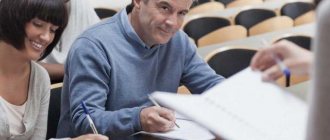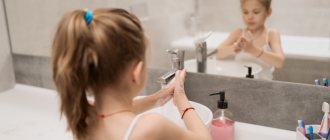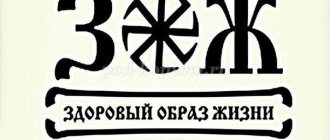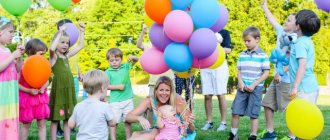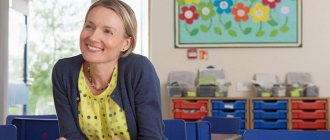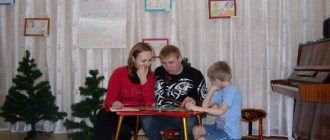Summary of the parent meeting for the middle group of kindergarten at the beginning of the school year
Parent meeting “The journey in the footsteps of knowledge continues, or just forward!”
The meeting is held at the beginning of the school year, where parents are congratulated on the start of the school year, introduced to new families, as well as specialists.
Parents are introduced to the characteristics of children 4-5 years old, the speech development of children of middle preschool age and the peculiarities of the educational process in the middle group, new joint projects. The parent meeting is accompanied by a presentation. Goal: expanding contact between teachers and parents; modeling prospects for interaction for the new academic year; improving the culture of parents. Objectives: consider the age and individual characteristics of children 4-5 years old; introduce parents to the tasks and features of educational work; update the personal data of the families of the pupils; teach parents to observe the child, study him, see successes and failures, try to help him develop at his own pace; intensify work on children's speech development. Form of conduct : meeting - travel. Participants : educators, parents, educational psychologist, speech therapist teacher
Plan of implementation
1. Introductory part. 2. Congratulations to parents on the beginning of the school year. Presentation of letters of gratitude. 3. Meeting new families. 4. Election of new members of the parent committee. 5. Meeting specialists. 6. Speech by a psychologist. Topic: Features of children 4-5 years old. 7. Speech therapist’s speech. Topic: Features of speech development in children of middle preschool age. 8. Features of the educational process in the middle group. 9. Speech Art. teacher Topic: New joint projects. 10 Filling out the questionnaire by parents. 11. Final part.
Progress of the parent meeting
1. Calm music is playing.
Educator. Good evening, dear parents! We are very glad to see you in our cozy company! Today is our holiday. Try to guess which one. Our famous travelers turned 4 years old and entered the middle group of kindergarten! Let's pass on our wishes to our children. Exercise “Wish” Parents stand in a circle, the teacher plays a tambourine in a circle. You roll, merry tambourine, quickly and quickly through your hands. Whoever has a cheerful tambourine will tell us a wish. Parents' wishes can be recorded on a tape recorder or video camera so that children can listen to them and watch them. Educator. Well, summer has passed. And how you spent it, we will now find out with the help of exercises... 1. Exercise “How we spent the summer” - stand up, those who went with their child to the forest... (fishing); - stand up, you swam in the sea (swimmed with your child, sunbathed on the beach); — whose children’s backs burned from sunburn; - who read books to children; - who bought their child a ball (or any other item for physical activity); - whose children helped their parents at the dacha (in the garden); — whose child learned something new. 2. Exercise “How did you see your child in the summer?” - he is attentive: he helped me carry my bag from the dacha; - he is affectionate: he willingly kisses and hugs me; takes pity on animals: feeds his grandmother’s chickens and goat; - he is observant: he will always notice when a flower blooms, the sun sets or a cloud appears; - he is cheerful: he loves to sing, he never whines over trifles; - he is hardworking: he can water a garden bed for a long time and does the job to the end; - he is my favorite: I love him and really want everyone to love him. Educator. So, today we - teachers and parents - are setting off on a cruise in the footsteps of Knowledge (pointing to the poster), which will last for many more years, and the final destination of our journey is, of course, School. To go on such a long journey, we need reliable equipment and a beautiful, reliable means. This is our kindergarten and our group (a subject-development environment, without it the full comprehensive development of our children is impossible). Who helped to qualitatively prepare our group for the new school year? And today we want to express our gratitude to you and present letters of gratitude 2. Congratulations to parents on the beginning of the school year. Presentation of letters of gratitude Attention: news of the day! Our friendly company has been replenished with newcomers. Let's get to know them. 3. Meeting new families. Parents themselves briefly talk about their family. Educator. How can you go on a trip without a reliable team?! I propose to choose a parent committee of the group, which will organize all our joint projects together with the teachers. 4. Election of a new parent committee, if desired, we leave the parent committee in the same composition: - chairman of the parent committee (he is a representative from the group to the parent committee of the preschool educational institution); - Deputy Chairman of the Parents Committee (his right hand); - secretary of the parent meeting; Conclusion. In any team, understanding, good relationships, mutual assistance and mutual respect are very important. The conditions for harmonious relationships between children and parents, children and teachers, teachers and parents are the ability to give in to each other and mutual tolerance. 5.Acquaintance with specialized specialists And now let’s get acquainted with the teachers who conduct educational activities with our children (slide show). 6. Speech by a teacher-psychologist Educator . And now our tracks are ready to travel. No... we are still missing something! Of course, spam-pedagogical knowledge. Do you, dear parents, know the characteristics of our main travelers? What is it like for children aged 4-5 years? Now an educational psychologist will tell us about this. 7. Speech by a speech therapist Teacher: And a speech therapist will tell us about the peculiarities of speech development of children of middle preschool age (gives advice and recommendations, names days for individual consultations with parents). And now we want to dwell on the educational processes of preschoolers. Main directions: physical, social-personal, cognitive-speech, artistic-aesthetic. 8. Features of the educational process in the middle group. Taking into account the psychological characteristics of children 4-5 years old, the teacher uses game material, physical education minutes, and includes game situations aimed at relieving tension and switching children’s attention from one type of activity to another. The educational field of communication allows you to: enrich children's vocabulary; develop observation and curiosity; improve communication skills (polite and cultural) with peers and adults; develop aesthetic perception and understanding of the content of works of art; learn to construct a description logically and consistently, ask questions; improve the sound culture of speech, achieve clear pronunciation of sounds and words, correct emphasis; learn to answer in short and detailed sentences; teach the correct agreement of words in a sentence. The educational field of knowledge pays special attention to: caring for nature, things created by human labor; the formation of love for the native land. In the process of speech development, the development of fine motor skills of the hands is of great importance; it is necessary to use coloring books. Coloring of objects should be done by shading (frequent or sparse) in a given direction: lying lines (horizontal), standing lines (vertical), inclined (“like rain”) - this contributes to the development of fine hand coordination. For mental development, the formation of elementary mathematical concepts and logical thinking is of great importance. In educational modeling activities, the ability to roll plasticine in a circular motion, flatten, connect in the form of a ring, and pinch the edges of the form is developed; learn how to sculpt objects from several parts and arrange the parts correctly. This contributes, on the one hand, to the formation of fine coordination of hand movements, and, on the other hand, to the development of spatial imagination. It is very important in educational activities in the fine arts not only to develop on the best works of art, but also to teach the combination of colors and shades to create an expressive image, to paint over drawings (with paints, gouache, pencils), to rhythmically apply strokes, strokes, without going beyond the contour; learn to correctly convey in a drawing the arrangement of parts when depicting complex objects (top, bottom, left, right), depict round, oval, rectangular and triangular shapes; learn to draw pattern elements (strokes, dots, straight lines, rings, arcs). All this is aimed at developing spatial imagination and hand muscles. Educational activities in physical education are aimed at strengthening children's health, developing correct posture, developing and improving motor skills. They are taught to walk and run, coordinating the movements of their arms and legs, crawl, climb, push off energetically and land correctly in jumps, and navigate in space. In music and rhythm classes, children learn to move in accordance with the nature of the music at a moderate and fast pace, independently change movements in accordance with the two- and three-part form of music, perform dance movements such as a straight gallop, “spring”, jumping, stepping on the toe on the heel, circling alone and in pairs, moving in pairs in a circle in dances and round dances; learn to perform movements with objects, expressively convey game images. They are instilled with an interest in playing music. 9. The floor is given to the senior teacher. New joint projects. 10. Final part Educator. The journey in the footsteps of Knowledge continues. We wish you success, interesting discoveries, fun games and true friends! Only forward! We invite everyone to a tea party. Reflection Parents are given paper silhouettes of their children's footprints and asked to write wishes on them.
We recommend watching:
Non-traditional parent meeting in the middle group of kindergarten Non-traditional parent meeting in the middle group Summary of the final parent meeting in kindergarten. Middle group Parents' meeting in the middle group. Speech development of children 4-5 years old
Similar articles:
Parent meeting in the middle group. Family traditions
Parent meeting in the middle group. Our grandparents in the family
Parent meeting in the middle group. Child's emotional well-being
Parent meeting in the middle group on the topic “Healthy lifestyle”
Parent meeting in the middle group. Reading fiction
